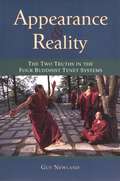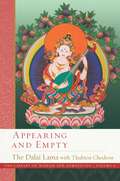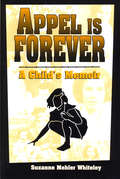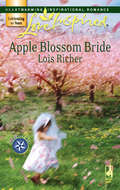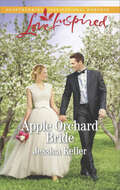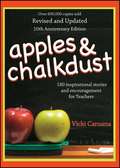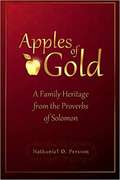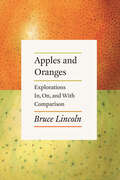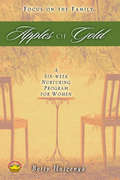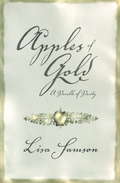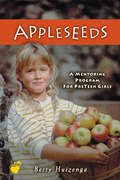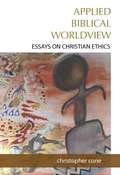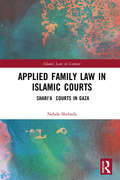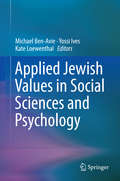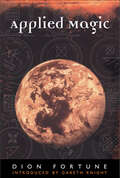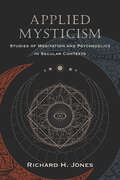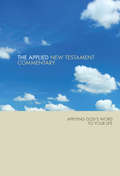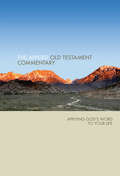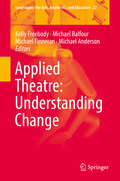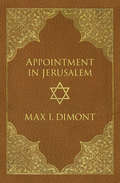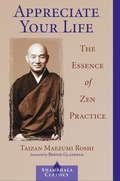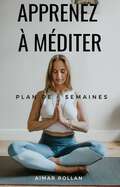- Table View
- List View
Appearance and Reality: The Two Truths in the Four Buddhist Tenet Systems
by Guy NewlandWhen someone seeks to understand Buddhism, where should that person start? With the meaning of taking refuge in the three jewels? With the four noble truths? The Dalai Lama, when asked this question, suggested that for many in the West today, understanding the two truths—conventional truth and ultimate truth—is the best place to start. When the Buddha awoke from the dream we still dream, he saw the ultimate reality of things just as they are. There are shifting appearances and conventions, the manners and traditions of the vast and diverse world; and then there is the mystery of the sheer reality of things. And yet we cannot find this reality anywhere else but right here. Each system of Buddhist philosophy has its own way of explaining exactly what these two truths are and how they relate to one another. In exploring these systems, we are looking over the shoulders of Buddhist thinkers as they grapple with a basic question: 'What is real?' This is not an idle intellectual exercise but a matter which cuts to the heart of our practice in life.
Appearing and Empty (The Library of Wisdom and Compassion #9)
by Venerable Thubten Chodron His Holiness the Dalai LamaIn this final volume on emptiness, the Dalai Lama skillfully reveals the Prasangikas&’ view of the ultimate nature of reality so that we will gain the correct view of emptiness, the selflessness of both persons and phenomena, and have the means to eliminate our own and others&’ duhkha.In this last of three volumes on emptiness, the Dalai Lama takes us through the Sautrantika, Yogacara, and Svatantrika views on the ultimate nature of reality and the Prasangikas&’ thorough responses to these, so that we gain the correct view of emptiness—the selflessness of both persons and phenomena. This view entails negating inherent existence while also being able to establish conventional existence: emptiness does not mean nothingness. We then learn how to meditate on the correct view by cultivating pristine wisdom that is the union of serenity and insight as taught in the Pali, Chinese, and Tibetan traditions. Such meditation, when combined with the altruistic intention of bodhicitta, leads to the complete eradication of all defilements that obscure our minds. This volume also introduces us to the tathagatagarbha—the buddha essence—and how it is understood in both Tibet and China. Is it permanent? Does everyone have it? In addition, the discussion of sudden and gradual awakening in Zen (Chan) Buddhism and in Tibetan Buddhism is fascinating.
Appel Is Forever: A Child’s Memoir
by Suzanne Mehler WhiteleyBorn in Amsterdam in 1935, Suzanne Mehler Whiteley saw the ravages of war through a child's eyes. Her memoir, written in the voice of a young girl, describes the years before the invasion of Holland, her experiences during the German occupation, her time spent in the Bergen-Belsen concentration camp, and her childhood afterward in Europe and then the United States. Appel Is Forever describes in a child's words atrocities that should never be seen by anyone. Through young Suzanne's introspection, readers are invited to see beyond the history of events to their deeper meaning. We come to see how the miracle of having survived opens a child up to the potential for playfulness and even happiness, while a young girl's observations of coming to her new country remind us of both the promises and hardships of the American dream.
Apple Blossom Bride (Serenity Bay Series, Book #2)
by Lois RicherAfter a car accident, Ashley Adams came home to Serenity Bay to heal her broken body-and her broken spirit. Her former teen crush, Michael Masters, was the last person she expected to see in town. . . and he was even handsomer than she remembered. Planning the town's winter festival brought Ashley back in contact with the dedicated single dad, and Ash found herself falling for him all over again, as well as his darling daughter. Yet pain-filled memories of the past threaten their budding romance. Only Ashley's search for the truth can lead them to love beneath the blossoms. -
Apple Orchard Bride: An Amish Reunion Apple Orchard Bride Rocky Mountain Cowboy (Goose Harbor #5)
by Jessica KellerA hometown reunion brings together old friends with a past that faith and forgiveness can overcome. From the author of Small-Town Girl.When Toby Holcomb becomes guardian to his cousin’s daughter, he goes from hard-living bachelor to father without a clue. One thing he can do is give Kasey a stable home. Returning to Goose Harbor, he takes a job at his childhood friend’s apple orchard. But Jenna Crest isn’t ready to forgive him for his past mistakes. Desperate for sweet Jenna’s help in raising his little girl, Toby vows to make amends to the woman he wronged so many years ago. Suddenly, he and Jenna and young Kasey are feeling more and more like a family. But convincing Jenna he’s a changed man will take all the love in his heart.“Enjoy this summertime romance tale full of wholesome flavors like apple pie, cider, apple dumplings, apple butter, and jelly.” —Fresh Fiction
Apple of His Eye (Amish Pie #1)
by Kelly CaldwellWhen Rob King, who is courting Tabitha Beiler, must go away for a time to aid his ailing grandfather, he charges his best friend, John Miller, with the care and keeping of the beautiful girl of his heart. John, who has been Rob&’s best friend since boyhood, accepts the responsibility with serious intent. But John discovers that it is his own traitorous heart that must be guarded as he finds himself falling hopelessly in love with his best friend&’s girl. As time goes on, Tabitha begins to see the serious differences between Rob and John, and she discovers the meaning of infatuation versus real love. But it is only through her baking that she can speak fully of where her heart now lies., How will Tabitha admit her love for John when doing so could mean the loss of a lifelong friendship? And how will the sweetness of a treasured pie recipe reveal a love of tender but unspoken devotion?
Applegate Landing
by Jean ConradGloriana Windemere arrives in Oregon Territory, expecting to face a trackless wilderness and hostile Indians. Instead, she discovers thriving settlements like Applegate Landing and a hostile frontiersman, Graham Norton. Gloriana finds herself clashing with Graham, but making friends with the Klamath Indians and a charming, though mysterious young army lieutenant, John Tilton. Meanwhile, unprotected settlers are being ambushed and slaughtered, with the massacres being blamed on a band of renegade Klamaths. Not until the Klamath Mission itself is under attack does Gloriana learn the identity of the real renegades. The only hope of survival is to find the man she has grown to love, who is working somewhere in the rugged lava mines of the new territory
Apples & Chalkdust: Inspirational Stories and Encouragement for Teachers
by Vicki CaruanaYou probably don't have to think very hard to recall a dedicated teacher who touched your life in a lasting way with encouragement and inspiration...teachers just have a way of knowing exactly what to do or say to help children and teens reach their highest potential. No wonder so many parents and kids are looking for a way to say thank you and return some of that inspiration. In this delightful, revised and updated, 10th Anniversary Edition, veteran educator Vicki Caruana meets teacher's right where they are, in the midst of flying chalkdust and papers to be graded. She provides refreshment and practical insights for embracing the challenges of teaching with renewed vigor and creativity.
Apples and Oranges: Explorations In, On, and With Comparison
by Bruce LincolnComparison is an indispensable intellectual operation that plays a crucial role in the formation of knowledge. Yet comparison often leads us to forego attention to nuance, detail, and context, perhaps leaving us bereft of an ethical obligation to take things correspondingly as they are. Examining the practice of comparison across the study of history, language, religion, and culture, distinguished scholar of religion Bruce Lincoln argues in Apples and Oranges for a comparatism of a more modest sort. Lincoln presents critiques of recent attempts at grand comparison, and enlists numerous theoretical examples of how a more modest, cautious, and discriminating form of comparison might work and what it can accomplish. He does this through studies of shamans, werewolves, human sacrifices, apocalyptic prophecies, sacred kings, and surveys of materials as diverse and wide-ranging as Beowulf, Herodotus’s account of the Scythians, the Native American Ghost Dance, and the Spanish Civil War. Ultimately, Lincoln argues that concentrating one's focus on a relatively small number of items that the researcher can compare closely, offering equal attention to relations of similarity and difference, not only grants dignity to all parties considered, it yields more reliable and more interesting—if less grandiose—results. Giving equal attention to the social, historical, and political contexts and subtexts of religious and literary texts also allows scholars not just to assess their content, but also to understand the forces, problems, and circumstances that motivated and shaped them.
Apples of Gold
by Betty HuizengaHere's what women are saying about Apples of Gold . . . "The lessons were awesome! God knew I needed to be there. My heart overflows with joy."K.B., Michigan"In your kitchen I learned about seasoning food. In your living room I reacquainted myself with the seasoning work of the Holy Spirit."S.O., Michigan"The program gives value to women who are homemakers and wives. The Bible study and cooking lessons improved my perspective on staying home with children. . . . The program is a good eye-opener and refresher to what is really important: God, husband, children, family, and friends."D.S, Minnesota"So many positive things have happened in my life since, and because of, my Apples of Gold summer. Much confidence was gained that went far beyond the kitchen. . . . This was truly a life changing experience!"L.D., Michigan"God knew I needed Apples of Gold. It is probably inconceivable to you to know how you and the mentors have touched the lives of Apples of Gold moms!"L.C., Michigan"I loved being with older women, finding out how much we have in common, and building relationships with a different generation."J.R., Michigan"Apples of Gold makes you focus on what is really important in your life. We discussed subjects I was not familiar with, like the real meaning of submission and purity. It certainly has changed the way I feel about them."D.H., Minnesota "Apples of Gold takes the warm atmosphere of the home and teaches how to extend it beyond the immediate family."Gail Hover LedbetterAuthor, Family Fragrance
Apples of Gold: A Parable of Purity
by Lisa Samson"Once upon a time, many years ago, when true love walked hand in hand with kisses and promises, and decisions were made to last forever, two girls received a summons to appear before the governor. . . . " So begins the story of two sisters in a long-ago land who are presented with a precious gift. The governor wants the young women to protect and care for this gift until the return of his son, the prince of the land. Upon the prince's return, one sister will be chosen to serve the prince according to how the gift was cared for-and both sisters will be surprised by what the prince wants to offer the one who best cherishes the gift. The young women have dreams of being happy and loved. But how they see the gift-and themselves-will determine how that gift is treasured and what will remain of their dreams. Apples of Gold is a powerful parable about the beauty of sexual purity and the prize that awaits those who are committed to the keeping of such a gift.
Appleseeds
by Susan Martins Miller Betty HuizengaYou are important to God - so important that He wants you to be all you can be for Him! Girls -- Have you ever wished you had an older woman--someone besides mom--to talk to about important things? Do you sometimes find it hard to understand what God is saying in His Word, the Bible? Would you like to feel more comfortable in social settings like fancy dinner parties? Do you like to have fun? Appleseeds is for YOU! Moms -- Do you sometimes wonder what your pre-teen is thinking? Do you wish for an older woman's advice? Would you like help in developing your daughter's self image and social skills? Have you longed for a Bible study that was uniquely crafted to teach your daughter about God? Would you like to spend some time having fun with your daughter? Appleseeds is for YOU! Appleseeds is a unique mentoring program for girls ages 9 to 12. The purpose of Appleseeds is to teach young girls how important they are to God, to their family and to others around them. They will learn that they are created in the image of God, that they are valuable to God and others. Like Apples of Gold, Appleseed classes are held in Homes with 'Grammy' mentors teaching the Bible lesson. Moms of the girls will come to help with the etiquette and craft sessions. They will be taught that serving God and others is a high calling, and hopefully, everyone will have lots of FUN in the process.
Applications for Living: Holistic Living, Relationships, Abundance and Right Livelihood
by Neale Donald WalschIn Applications for Living, Neale Donald Walsch has distilled the principles of Conversations with God through his own life experience into a universal formula for living well. Holistic Living shows that all individuals can and should achieve emotional, sexual, intellectual and spiritual fulfilment, as well as abolishing negative, unproductive habits. Relationships examines common patterns that hinder our ability to build and maintain successful relationships, and teaches us to move beyond restrictive ways of relating. Abundance and Right Livelihood explains the author’s simple and practical philosophy for achieving abundance, and how to learn what your ‘right livelihood’ is. Inspirational, practical and humorous, Neale Donald Walsch reveals in Applications for Living how we can use our own mistakes and experiences as stepping stones to a higher awareness and greater fulfilment in life.
Applied Biblical Worldview: Essays On Christian Ethics
by Christopher ConeSo What Applied Biblical Worldview: Essays on Christian Ethics answers this philosophically significant question by examining worldview foundations and ethics implications for Christians and non-Christians alike. Building with a Biblical framework, several key areas are considered including: individual conduct, life and death, gender, sexuality, marriage, parental relationships, church function, economics, government, social justice, environment, pluralism, and the future.
Applied Family Law in Islamic Courts: Shari’a Courts in Gaza (Islamic Law in Context)
by Nahda ShehadaWritten from an ethnographic perspective, this book investigates the socio-legal aspects of Islamic jurisprudence in Gaza-Palestine. It examines the way judges, lawyers and litigants operate with respect to the law and with each other, particularly given their different positions in the power structure within the court and within society at large. The book aims at elucidating ambivalences in the codified statutes that allow the actors to find practical solutions to their (often) legally unresolved problems and to manipulate the law. The book demonstrates that present-day judges are not only confronted with novel questions they have to find an answer to, but, perhaps more importantly, they are confronted with contradictions between the letter of codified law and their own notions of justice. The author reminds us that these notions of justice should not be set a priori; they are socially constructed in particular time and space. Making a substantial contribution to a number of theoretical debates on family law and gender, the book will appeal to both academic and non-academic readers alike.
Applied Jewish Values in Social Sciences and Psychology
by Yossi Ives Michael Ben-Avie Kate LoewenthalThis volume interweaves concepts and methods from psychology and other social sciences with Jewish ideas and practices in order to address contemporary social issues. This volume brings together pioneering research from scholars in such fields as psychology, education, and religious studies. The authors integrate insights from Jewish texts and practices with the methods and concepts of the social sciences to create interventions that promote the well-being of children, adults, families, communities, and society. Divided into three sections - Education, Psychological Well-Being, Society and Beyond- this book shows how this integrationist approach can deepen our understanding and generate new insights around pressing social challenges to impact positive change in the lives of people and communities.
Applied Magic
by Dion FortuneApplied Magic is a selection of Dion Fortune's writings on the practical applications of magical and esoteric techniques. Everyone has the ability to access the invisible planes of existence- a whole kingdom of mind and spirit- which cannot be perceived with the physical senses. Fortune provides invaluable guidance to anyone intent on increasing their inner awareness. She declares, "Esoteric tradition admits of no exclusiveness; it is the very essence of its spirit that it blasphemes no God that has been hallowed by our devotion. It sees all religions as the expressions of our spirit rather than the personal revelation of a jealous God to His chosen people. It suffers from neither superstitious awe nor bigoted fear."
Applied Mysticism: Studies of Meditation and Psychedelics in Secular Contexts
by Richard H. JonesExamines how mystical practices and experiences are being applied in secular contexts today.Today is an exciting time for mysticism. Interest in mysticism today often involves what Aldous Huxley called "applied mysticism"-that is, taking mystical practices and experiences out of their traditional contexts, where the focus was on the total transformation of the individual, and applying them (often within a secular framework) to help other people with more limited this-worldly problems, such as a person's well-being in society or general social change. Neuroscientists are taking mystical experiences seriously, studying meditators and psychedelic subjects to gain knowledge of how the brain works. Cognitive scientists are exploring mystical altered states of consciousness to expand the spectrum of consciousness states-in particular, whether there is a state of "pure" consciousness. Buddhist meditation is being taken out of its religious contexts and adapted by psychotherapists to help with problems such as depression or addiction. The use of psychedelics in psychotherapy is also gaining traction while New Age thinkers are extolling the alleged merger of post-Newtonian science with mysticism. Mystical ideas are being adapted to problems on the social level-for example, in "socially-engaged" Buddhism. This is the first book to explore all these varieties of applied mysticism together and to examine the current state of the field (with a focus on philosophical issues) in a readily accessible manner.
Applied NT Bible Commentary
by Tom Hale Steve ThorsonThe wisdom found in God's Word is timeless, as relevant today as when it was first written. And the challenge for believers remains unchanged: how do we apply these truths to our everyday world?The Applied Commentary series is a fresh approach to Bible study, connecting great wisdom with your life today. Each Scripture passage is enhanced with insights on key themes and ideas. Featured articles provide a deeper look at essential concepts, while the contemporary language allows for easy reading. And because some subjects are open to interpretation for discussion, we've included perspectives from leading theologians from all backgrounds and denominations. The result?An interactive approach to Scripture that will challenge your ideas and build your faith--which is what reading the Bible is all about.
Applied OT Bible Commentary
by Tom Hale Steve ThorsonThe wisdom found in God's Word is timeless, as relevant today as when it was first written. And the challenge for believers remains unchanged: how do we apply these truths to our everyday world?The Applied Commentary series is a fresh approach to Bible study, connecting great wisdom with your life today. Each Scripture passage is enhanced with insights on key themes and ideas. Featured articles provide a deeper look at essential concepts, while the contemporary language allows for easy reading. And because some subjects are open to interpretation for discussion, we've included perspectives from leading theologians from all backgrounds and denominations. The result?An interactive approach to Scripture that will challenge your ideas and build your faith--which is what reading the Bible is all about.
Applied Theatre: Understanding Change (Landscapes: the Arts, Aesthetics, and Education #22)
by Michael Anderson Kelly Freebody Michael Balfour Michael FinneranThis volume offers researchers and practitioners new perspectives on applied theatre work, exploring the relationship between applied theatre and its intent, success and value. Applied theatre is a well-established field focused on the social application of the arts in a range of contexts including schools, prisons, residential aged care and community settings. The increased uptake of applied theatre in these contexts requires increased analysis and understanding of indications of success and value. This volume provides critical commentary and questions regarding issues associated with developing, delivering and evaluating applied theatre programs. Part 1 of the volume presents a discussion of the ways the concept of change is presented to and by funding bodies, practitioners, participants, researchers and policy makers to discover and analyse the relationships between applied theatre practice, transformative intent, and evaluation. Part 2 of the volume offers perspectives from key authors in the field which extend and contextualize the discussion by examining key themes and practice-based examples.
Appointment in Jerusalem: A Search for the Historical Jesus
by Max I. DimontThe acclaimed author of Jews, God, and History considers the historical Jesus &“in the spirited, witty, fascinating manner in which his scholarship excels&” (Bookviews). Biblical historian Max Dimont, author of the classic Jews, God, and History, explores the mystery surrounding the predictions Jesus made about his fate. Examining the gospel, Dimont re-creates the drama in three acts using his knowledge of the events recorded in the Bible. Thoughtful and fascinating, Appointment in Jerusalem examines the questions that have surrounded religion for centuries. Who was Jesus, the Christian messiah or a member of a Jewish sect? Dimont&’s insight is intelligent and surprising.
Appreciate Your Life: The Essence of Zen Practice
by Wendy Egyoku Nakao Eve Myonen Marko Taizan MaezumiHere is the first major collection of the teachings of Taizan Maezumi Roshi (1931-1995), one of the first Japanese Zen masters to bring Zen to the West and founding abbot of the Zen Center of Los Angeles and Zen Mountain Center in Idyllwild, California. These short, inspiring readings illuminate Zen practice in simple, eloquent language. Topics include zazen and Zen koans, how to appreciate your life as the life of the Buddha, and the essential matter of life and death. Appreciate Your Life conveys Maezumi Roshi's unique spirit and teaching style, as well as his timeless insights into the practice of Zen. Never satisfied with merely conveying ideas, his teisho, the Zen talks he gave weekly and during retreats, evoked personal questions from his students. Maezumi Roshi insisted that his students address these questions in their own lives. As he often said, "Be intimate with your life." The readings are not teachings or instructions in the traditional sense. They are transcriptions of the master's teisho, living presentations of his direct experience of Zen realization. These teisho are crystalline offerings of Zen insight intended to reach beyond the student's intellect to her or his deepest essence.
Apprenez à méditer: Plan de 8 semaines
by Aimar RollánDans ce livre tu apprendras à méditer de A à Z, chez toi, assis sur une chaise à l'occidental. Nous apprendrons la théorie de base et quelques techniques simples mais profondes de méditation, basées sur la "pleine conscience", le yoga et le zen. Nous renforcerons les habitudes grâce à un programme de 8 semaines, spécialement tracé pour fomenter en nous l'habitude de méditer tous les jours dans un coin de la maison. Il n'est pas nécessaire d'avoir des connaissances préalables, ni de pouvoir s'asseoir avec les jambes croisées, ni d'être religieux ou amoureux des traditions orientales. La méditation est une technique universelle qui nous aidera à contrôler notre esprit, à réduire le stress et à mieux nous connaître. Nous commencerons par méditer une minute par jour et à la fin des 8 semaines nous serons capables de méditer 20 minutes d'affilée. L'idée est que la méditation fasse partie de notre quotidien pour qu'elle puisse nous aider à avoir une vie plus remplie et heureuse. Qu'apprendras-tu avec ce livre? - Qu'est-ce que méditer ? - Histoire de la méditation. - Différence entre la méditation et le mindfulness. - l'importance de l'habitude et de la routine. - Comment fonctionne l'esprit. - Comment t'asseoir correctement sur une chaise pour méditer. - La technique de la respiration abdominale. - Techniques de méditation de base. Quelles sensations pouvons-nous ressentir durant la méditation. - Comment progresser convenablement. Ce livre complète le cours de méditation pour débutants que l'auteur diffuse sur sa chaîne YouTube. "Toutes les misères de l'homme dérivent du fait qu'il n'est pas capable d'être assis tranquillement, seul, dans une pièce" Blaise Pascal.
